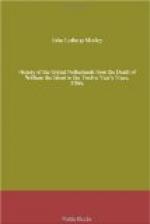The flat-bottomed boats, drawing two or three feet of water, would be more appropriate than ships of war drawing twenty feet. The passage across, in favourable weather, might occupy from eight to twelve hours.
The number of troops for the invading force should be thirty thousand infantry, besides five hundred light troopers, with saddles, bridles, and lances, but without horses, because, in Alexander’s opinion, it would be easier to mount them in England. Of these thirty thousand there should be six thousand Spaniards, six thousand Italians, six thousand Walloons, nine thousand Germans, and three thousand Burgundians.
Much money would be required; at least three hundred thousand dollars the month for the new force, besides the regular one hundred and fifty thousand for the ordinary provision in the Netherlands; and this ordinary provision would be more necessary than ever, because a mutiny breaking forth in the time of the invasion would be destruction to the Spaniards both in England and in the Provinces.
The most appropriate part of the coast for a landing would, in Alexander’s opinion, be between Dover and Margate, because the Spaniards, having no footing in Holland and Zeeland, were obliged to make their starting-point in Flanders. The country about Dover was described by Parma as populous, well-wooded, and much divided by hedges; advantageous for infantry, and not requiring a larger amount of cavalry than the small force at his disposal, while the people there were domestic in their habits, rich, and therefore less warlike, less trained to arms, and more engrossed by their occupations and their comfortable ways of life. Therefore, although some encounters would take place, yet after the commanders of the invading troops had given distinct and clear orders, it would be necessary to leave the rest in the, “hands of God who governs all things, and from whose bounty and mercy it was to be hoped that He would favour a cause so eminently holy, just, and His own.”
It would be necessary to make immediately for London, which city, not being fortified, would be very easily taken. This point gained, the whole framework of the business might be considered as well put together. If the Queen should fly—as, being a woman, she probably would do— everything would be left in such confusion, as, with the blessing of God, it might soon be considered that the holy and heroic work had been accomplished: Her Majesty, it was suggested, would probably make her escape in a boat before she could be captured; but the conquest would be nevertheless effected. Although, doubtless, some English troops might be got together to return and try their fortune, yet it would be quite useless; for the invaders would have already planted themselves upon the soil, and then, by means of frequent excursions and forays hither and thither about the island, all other places of importance would be gained, and the prosperous and fortunate termination of the adventure assured.




